Lisa Norton
Act as energy collector and catalyst of proposals, projects and people… in order to give Italy, Europe and the entire world new development perspectives and fresh growth energy. (Renaissance Link)
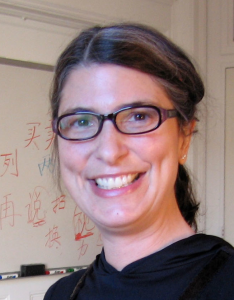
Lisa Norton
When the context is Italy and the theme is design leadership, singling out any one individual is no easy task. Despite the glittering achievements of his fellows, I especially admire Francesco Morace for his deft inter-organizational collaborations that synthesize the sociology of culture, design, and futuring. I interviewed Francesco Morace about Future Concept Lab, the omni-platform that, since 1989, has fused sociological methods, market research and trend forecasting in a syncretic anticipation of cultural futures.
Future Concept Lab relies on teams of experts including sociologists, anthropologists, designers, strategists and psychologists, differently purposed. With headquarters in Milan and a second office in São Paulo, its 50 globally distributed correspondents research and creatively proposition, rather than sell, trend forecasts. The core resource is the intelligence derived from on-going monitoring of lifestyle and behavioural trends in key global cities cross-correlated through the experiences of twelve different consumer clusters elucidated over the last twenty years. Morace describes his client deliverables as ‘homemade’ lending stress to the highly customized nature of his client partnerships, many of which are long-standing mutual investments in bringing forth positive futures.
Future Concept Lab creates interpretive scenarios by market sector, and creatively collaborates with top firms and civic entities notably BMW, Coca-Cola Company, The Walt Disney Company, LG Electronics, Mercedes-Benz, Natura Cosméticos, Nokia, Petrobras, Philips, Samsung, and Whirlpool. Regardless of the scale of the firm, Future Concept Lab invests in social, economic and technological innovation by means of a LAB within the client organization, working along side the internal team. Multi-Year Observatories are custom designed to allow in-depth investigations, longer time frames, and shared commitments such as an international research program with Whirlpool that began in 1999. Other examples include “No Logo, Yes Place” for the Bogotá Colombia Chamber of Commerce and for Philips Design, the biennial project “Vision of the Future” which studied quality of urban life and energy futures resulting in the publication of the book City, People, Light (1994). The Mindstyles Program focused on corporate positioning, and resulted in DNA BRASIL: Tendencias e conceitos emergentes para as cinco regioes brasileiras (DNA BRAZIL: Trends and emerging concepts for the five Brazilian regions).
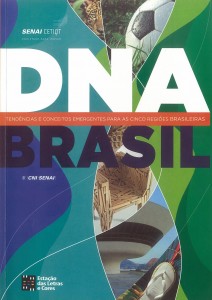
DNA Brasil Cover
Future Concept Lab hybridizes the functions of research and consulting in a transversal mixed-methods process logic that Morace refers to as ‘spiral’. Future Concept Lab research methodologies are attuned to all four quadrants of human experience. There is a balance of attention to physical artifacts, behaviors, experiences attitudes and values, cultural norms and local flavor, local infrastructure, and global systems, all in multivalent relationship. Trends can be understood as proto- or emergent typologies, and thus lend themselves to left-hand quadrant, interpretive disclosure for right-hand quadrant legibility and application.
Our research methodologies allow for an organic layering and a holistic reading of phenomena, leaving significant room for unexpected connections, in a labyrinth like global scenario, such as that of the web. Within this format ethno-anthropological rigor is very important, confirmed by quali/quanti research method updates, in order to be able to effectively extract the trends and concepts to be applied innovatively in different areas of the market.(personal correspondence)
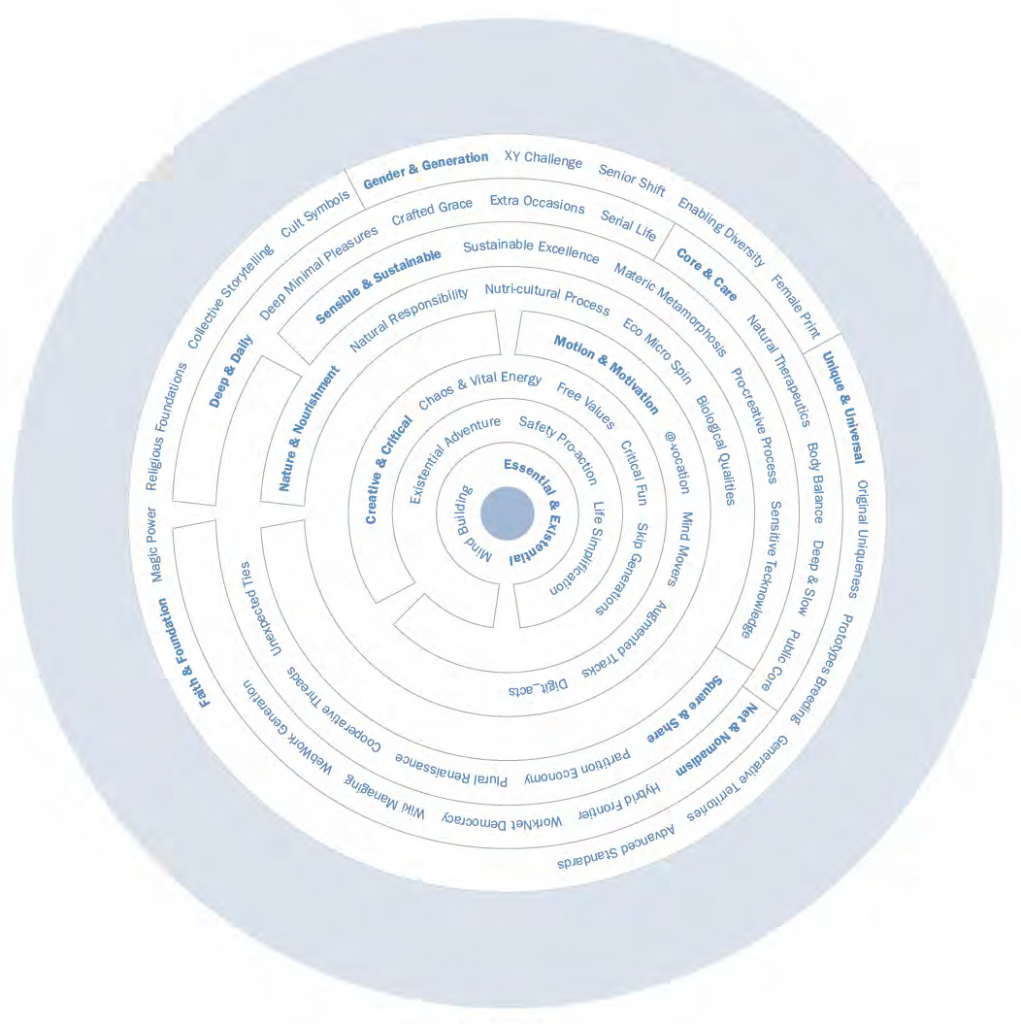
Mindstyles Labarynth
Somewhere “between sociology and cool-hunting” (Morace 22) experimental research methodologies draw from semiology, anthropology and ethnography, and combine data mining with observational research. Future Concept Lab functions as a hub for demographic, psychographic, geographic and technologic data, as well as a scanner for weak signals, gestural cues, and latent needs disclosed by social science field methods thus transcending yet including big data forecasting formulas. Unlike other marketing, branding and positioning firms, Future Concept Lab is a multi- modal ‘collaboratory’ with the flexibility to think and do in time and space.
It is necessary to study and identify the particularities that are typical of each micro/macro environment, bearing in mind that what happens on a geographically defined territory is the result of a socio-cultural landscape that is in continuous evolution. We argue that it is not enough to employ quantitative research, focus groups, semiology, or coolhunting as separate fields of knowledge. Instead, what signifies a change is the acknowledgement and the new awareness that all these tools need to be considered part of a whole integrated and dynamic platform, which is designed in order to understand and relate to the market. (Morace 45-47)
Assuming a long time horizon, Morace characterizes the evolutionary dimension as ‘fundamental’ to his vision.
…following the dynamics of the trends for the past 23 years has been essential for us, and allows us to place the right amount of importance on phenomena from the world of fashion and design, as well as those changes of deeper importance in society. For this reason it is also important for us to highlight the difference between paradigms (25/30 years) megatrends (10/15 years) and trends (3/5 years). It is necessary to understand that there are fundamental differences in the duration and depths of these…(personal correspondence)
In a recent ebook first developed within the context of ongoing research done with Accenture, Paradigms of the Future: A Trend Exploration, Morace references Edgar Morin’s rendering of paradigm:
The paradigm is both underground and sovereign in all theories, doctrines, and ideologies. The paradigm is unconscious but it irrigates and controls conscious thought, making it also Super-conscious. In short, the paradigm institutes primordial relations that form axioms, determine concepts, command discourse and/or theories. It organizes their organization and generates their regeneration. (Morin 18-19)
In Paradigms of the Future, Morace interprets significant global trends over the last ten years, and describes what he sees as four deep indicators of a shift from postmodern to post-postmodern worldspaces. For example, he sees qualities of exception and attractiveness will inform the dialectical paradigm he dubs Unique & Universal, an evocation of both depth and span.
The shared and opposed needs of individualism and collectivism tend to oversimplify and collapse dialogue… The antimony between the local and global will be permanently left behind. (Morace 1433)
His second paradigm, Crucial & Sustainable is a new pattern of values emerging, emphasizing wellbeing and quality on the individual and societal scales. Selectivity and sustainability set a tone that negotiates both delight and discernment in a context of crucial resources rather than superfluous wants. Credibility and sharing define the third paradigm, Trust & Sharing that Morace relates to conviviality and even a hyper-relationality. Morace sees this new politico-social space as requiring the exercise of multiple forms of intelligence:
Credibility is replacing visibility as a value parameter, a prerequisite to sharing. The virtuous short-circuit (made possible by trust and loyalty). (Morace 1477)
In his fourth paradigm, timeliness and daily happiness equate to what he calls Quick & Deep, meaning not speed, but timeliness and satisfaction in the context of a qualitative shift from Kronos to Kairos.
Within the vital experience there is an alternation between slowness and quickness. That is why it is often necessary to take a moment to reflect on things and slow down, in order to enable us to react better in times when it is really important. The concept is therefore linked to a notion of quick, to speedy reactions, but at the same time, it is also connected to an idea of deep, of our capability to be happy and have profound responses. (Morace 1481-82)
Speaking of quick, I first became aware of Morace’s work through the radically propositional Project F for Whirlpool. Future Concept Lab’s longstanding relationship with the Whirlpool Europe design division led by Alessandro Finetto enabled this blue-sky approach to re-imagining the future of the white goods industry. Taking up to a week to wash clothes, BioLogic employs time, but not resource intensive routines that radically re-imagine our relationship to time, energy, labor and domesticity. In his book In the Bubble, John Thackara described Project F:
Morace is fascinated by “the new domesticity”. …hydroponic purification of water was coupled with fuel-cell technology to provide a “slow wash” approach called BioLogic, based on natural principles of regeneration and efficiency. Nature transforms sunlight, carbon dioxide, water, nutrients into action: plant germination, growth, and the production of oxygen. It is a slow, steady process, but it is auto regenerative and chemically efficient. Morace explained that, “BioLogic is a design that embodies a sense of care…” BioLogic uses phito-depuration (a technique to clean used waters which are first separated according to their different origin, that relies on aquatic and earthly plants-and time-rather than on strong chemicals and speedy but energy guzzling electromechanical processes) with hydroponic plants to renew wash water and fuel cells for power…One tends to one’s wash as one would tend one’s garden…Rather than remaining an isolated event in a more or less anonymous box, washing recaptures its lost significance and becomes part of an ongoing process that can take place any place in the home. In this way, biologic creates space, rather than just occupying it. The sound of gently flowing water, the scent of the plants, and the glow of lights: All make for a product experienced through the senses and emotions. (Thackara 45-46)
Depending on the needs of the client or project at hand, Future Concept Lab functions like a think tank, incubator, journalistic ‘mirror’, or scholarly colloquium. In a vision of globalization that does not flatten or standardize consumer experience, The Genius Loci Program seeks to discover cultural distinctions of place. This ongoing platform resulted in the publication of La Estrategia del Colibri: la globalizacion y su antidote. (The Hummingbird Strategy: Globalization and its antidote). The Street Signals Program tracks the bottom-up distributed networks of everyday street culture, and the Happiness Program conducts research on values as essential drivers of true cost economic indices of the future. Generational Targets, a finer-grained approach to demographic analysis departs from conventional market segmentation based on age brackets, to identify goals and values oriented tribes such as ‘linker people’, ‘pleasure growers’ and ‘normal breakers’. In addition to publishing a wide array of books and emedia, Future Concept Lab also conducts training workshops to share their proprietary research methods with industry professionals. Future Vision Workshops have focused on: fashion and design, consumption, communication and advertising, and retail.
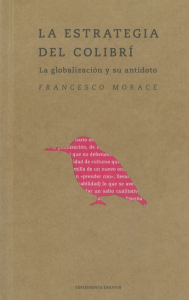
La Strategia del Colibri Cover
Future Concept Lab correspondents are trained to map their city and conduct their analysis based on ‘the 4P technique’ involving observation, description and documentation of innovative and inspirational People, Places, Plans and Projects. The protocol maps nicely onto the AQAL, demonstrating a deep and wide embrace of planetary culture as an evolutionary, open system inclusive of individual and collective interiors. Rather than merely following or predicting trends, recycling trend forecasts, or gesturing toward emotions, all of Future Concept Lab’s research platforms engage deeply held values and aspirations as attractors motivating individuals and groups. Of the moment, observational and behavioral feedback, is analyzed and interpreted within the instantiated characteristics of place as well as globally and cross-sectorally.
Morace is a professor at the renowned Domus Academy and Milan Polytechnic. He is co-founder of The Renaissance Link, a consortium representing the Made in Italy brand. As a sociologist, writer and journalist, his career skilfully straddles the popular/academic divide. Morace, with Future Concept Lab, has authored over 20 books on topics ranging from consumption to social change, notably amongst most recent publications are Verità e
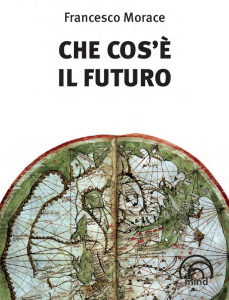
Che Cos’e il Futuro Cover
Bellezza (Truth & Beauty) and Il Talento dell’Impresa: L’Impronta Rinascimentale in dieci aziende italiane (The Talent of the Enterprise: traces of the Renaissance left by 10 Italian companies). His forthcoming book is entitled: Che Cos’è il Futuro (What is the Future?).
In discussing worldviews in flux between relativism and axiology, Morace exhibits a post-conventional outlook:
…the postmodern remains the definition of an era that is almost behind us, an era in which it was possible to both affirm and be contrary to everything, where image prevailed over substance and relativism did not offer any direction. The post-modern has however, demonstrated to be incapable of meeting these deep demands and therefore, unsustainable from many points of view, starting with a lack of responsibility. (Morace 1446-48)
The 2001 book The Hummingbird Strategy dedicated to inter-cultural pollination reversed the slogan Think Globally, Act Locally to Think Locally, Act Globally. FCL do Brasil is a great example of the logic of the paradigm Quick & Deep, collaborating with large Brazilian companies like Petrobras, Grendene, Natura and Alpargatas in celebration of Brazilian style, exuberance, charm and accessibility.
Ethnic identity and Earth consciousness should provide historical and emotional basis for making sense of one’s life, encouraging openness and cross-pollination rather than resistance and closure. (Morace 1431)
I asked Francesco Morace to describe his ‘hummingbird-like’ strategy for working with emergent systems and “inventing in advance what is not perceived as necessary”:
Our methodologies aid in enhancing the weak signals of change in society, as well as those elements that are emerging from grassroots levels, through the Web, social networks and from the extraordinary creativity of ordinary people. Our role is that of “facilitators” in a hermeneutic sense… (personal correspondence)
Works Cited
Falzone, Fabio. “Interview with Francesco Morace” Lancia Trend Visions. May 18, 2010
http://www.lanciatrendvisions.com/en/article/interview-with-francesco-morace
Morace, Francesco. Paradigms of the Future-A Trend Exploration. Milan: Future Concept Lab. 2012.
—, Personal correspondence November 21, 2012.
Morace, Francesco, et al. Renaissance Link Manifesto retrieved from: http://www.therenaissancelink.com/
—, “20 Years of Activity: Future Concept Lab”. Milan: Future Concept Lab. PDF Report. 2009.
—, Future Concept Lab http://www.futureconceptlab.com/htm/overview.htm
—, Genius Loci Lab http://www.geniuslocilab.com/
—, Salone del Mobile: http://www.designboom.com/snapshots/milan_02/whirlpool.html
—, Project F. Whirlpool website http://www.project-f.whirlpool.co.uk/
Morin, Edgar. Seven Complex Lessons in Education for the Future. Paris: UNESCO. 2001, cited in Paradigms of the Future-A Trend Exploration. Milan: Future Concept Lab. 2012.
Thackara, John. In the Bubble. Cambridge: MIT Press. 2006.
About the Author
Lisa Norton, Professor, the School of the Art Institute of Chicago, Department of Architecture, Interior Architecture and Designed Objects. Professionally she consults with educational organizations on development and change in the design educational and professional contexts. lisanorton@mac.com
